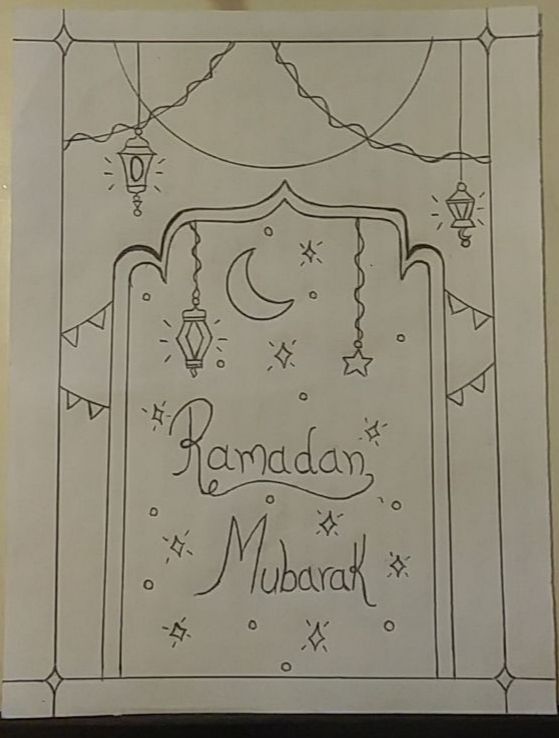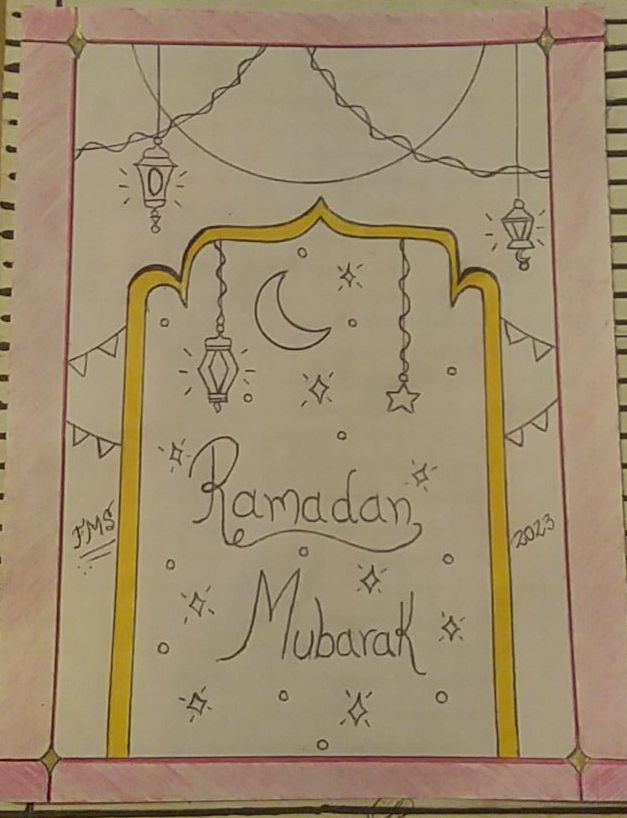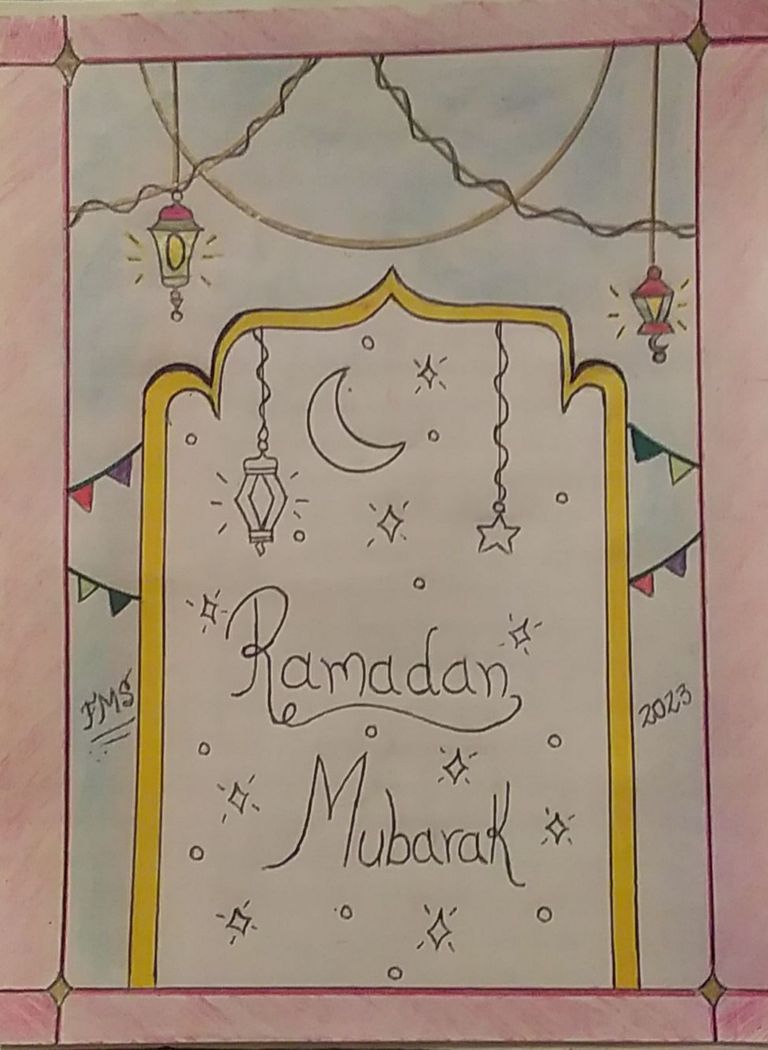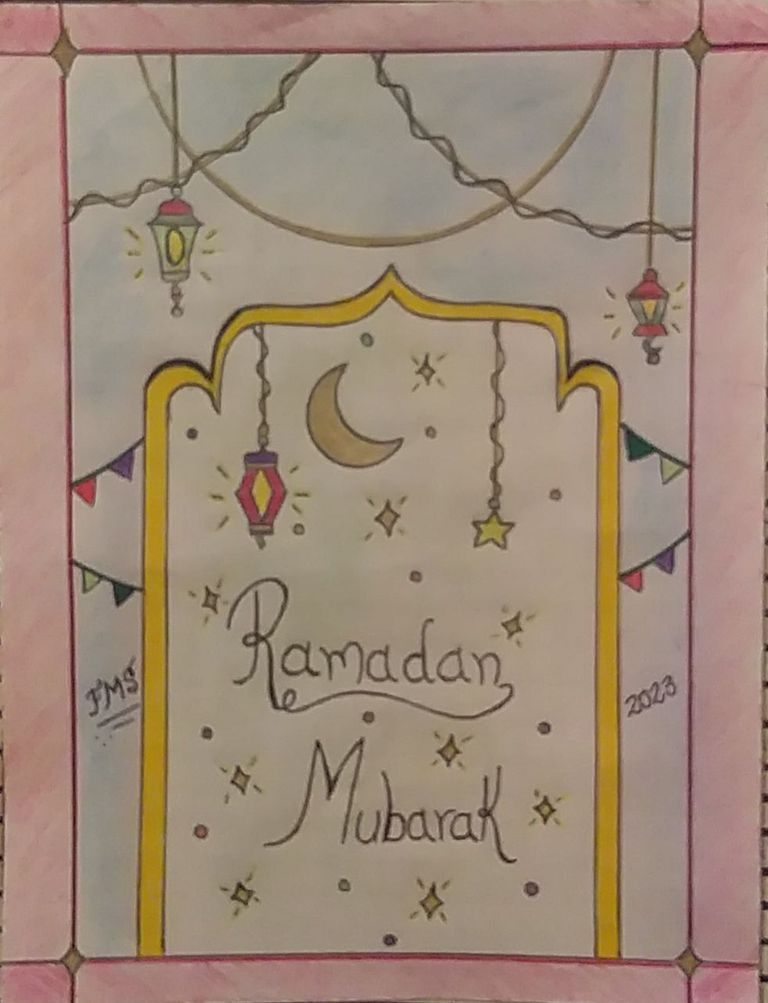
Dibujo realizado por el autor.
Título: Festividades religiosas: Ramadán, origen, propósito y cultura.Por Florencia Renata.
Con la aparición de la luna creciente se marca el inicio del Ramadán, un tiempo de contención, piedad y autorreflexión para los musulmanes. Cada año, los musulmanes en todo el mundo se anticipan a la luna creciente, ya que es la señal que indica el comienzo del primer día oficial del Ramadán, que corresponde al noveno mes del calendario islámico, y por ende el más sagrado dentro de su cultura. Esta festividad religiosa se encuentra determinada por un comité de avistamiento de la luna ubicado en Arabia Saudí, quienes observan el astro nocturno conforme al calendario islámico lunar que sigue sus fases.

Dibujo realizado por el autor.
El nombre Ramadán proviene de la raíz árabe “ar-ramad” que significa “calor abrasador”. Los musulmanes creen que en el año 610 d.C, el ángel Gabriel se le apareció al profeta Mahoma y le reveló el Corán (libro sagrado del Islam). Ésta revelación lleva por nombre “Laylat Al Qadar” (“La Noche del Poder) y tuvo lugar durante el Ramadán, razón por la que los musulmanes ayudan durante ese mes, a modo de conmemorar la revelación del Corán y su profeta.

Dibujo realizado por el autor.
Durante este mes, los musulmanes de proponen crecer espiritualmente, así como establecer relaciones más sólidas en su vínculo con Alá. Esto lo hacen por medio de acciones de bondad, generosidad, rezos, recitaciones del Corán, ayuno obligatorio desde la salida hasta la puesta del sol, acciones desinteresadas hacia sus semejantes, iniciar actividades positivas, expiación de pecados, perdonando, presentar respetos por los familiares fallecidos…

Dibujo realizado por el autor.
En los distintos países del mundo se observan distintas tradiciones durante el mes del Ramadán, pero algunas están más arraigadas que otras, como: los momentos de piedad y reflexión, el estruendo del cañón del iftar para marcar la ruptura diaria del ayuno, despertarse temprano cada día, el uso de decoraciones con lámparas, luces y flores, los banquetes comunales con gran variedad de platos tradicionales que reúnen a las familias en una gran mesa cada noche. Más allá de lo que podamos pensar, el mes sagrado para los musulmanes no se trata de ayuno e inactividad, se trata, conforme a lo que los pilares del islam establecen, el mes donde los mulsumanes deben limpiar su alma, su corazón y su espíritu por medio de actividades en favor del prójimo y el desarrollo de la empatía de lo que otros puedan sentir o estar viviendo; pues el propósito de vivir la experiencia del Ramadán es que una vez finalice debes ser una mejor persona.

Dibujo realizado por el autor.
English: Title: Religious holidays: Ramadan, origin, purpose and culture.By Florencia Renata.
The appearance of the crescent moon marks the beginning of Ramadan, a time of restraint, piety and self-reflection for Muslims. Every year, Muslims around the world anticipate the crescent moon, as it is the signal that indicates the beginning of the first official day of Ramadan, which corresponds to the ninth month of the Islamic calendar, and therefore the holiest within their culture. This religious holiday is determined by a moon sighting committee located in Saudi Arabia, who observe the night star according to the lunar Islamic calendar that follows its phases.

Dibujo realizado por el autor.
The name Ramadan comes from the Arabic root “ar-ramadan” which means “scorching heat”. Muslims believe that in the year 610 A.D., the angel Gabriel appeared to the Prophet Muhammad and revealed the Koran (Islam's holy book) to him. This revelation is called "Laylat Al Qadar" ("The Night of Power") and took place during Ramadan, which is why Muslims help during that month, by way of commemorating the revelation of the Qur'an and its prophet.

Dibujo realizado por el autor.
During this month, Muslims propose to grow spiritually, as well as establish stronger relationships in their bond with Allah. They do this through acts of kindness, generosity, prayers, recitations of the Qur'an, obligatory fasting from sunrise to sunset, selfless actions towards their fellow human beings, initiating positive activities, expiation of sins, forgiving, paying respects for deceased relatives...

Dibujo realizado por el autor.
Different traditions are observed in different countries of the world during the month of Ramadan, but some are more deeply rooted than others, such as: moments of piety and reflection, the roar of the iftar cannon to mark the daily breaking of the fast, waking up early every day, the use of decorations with lamps, lights and flowers, communal banquets with a variety of traditional dishes that gather families at a large table every night. Beyond what we may think, the holy month for Muslims is not about fasting and inactivity, it is, according to what the pillars of Islam establish, the month where mulsumans should cleanse their soul, their heart and their spirit through activities in favor of others and the development of empathy for what others may feel or be living; because the purpose of living the Ramadan experience is that once it ends you should be a better person.
Congratulations, your post has been curated by @r2cornell, a curating account for @R2cornell's Discord Community.